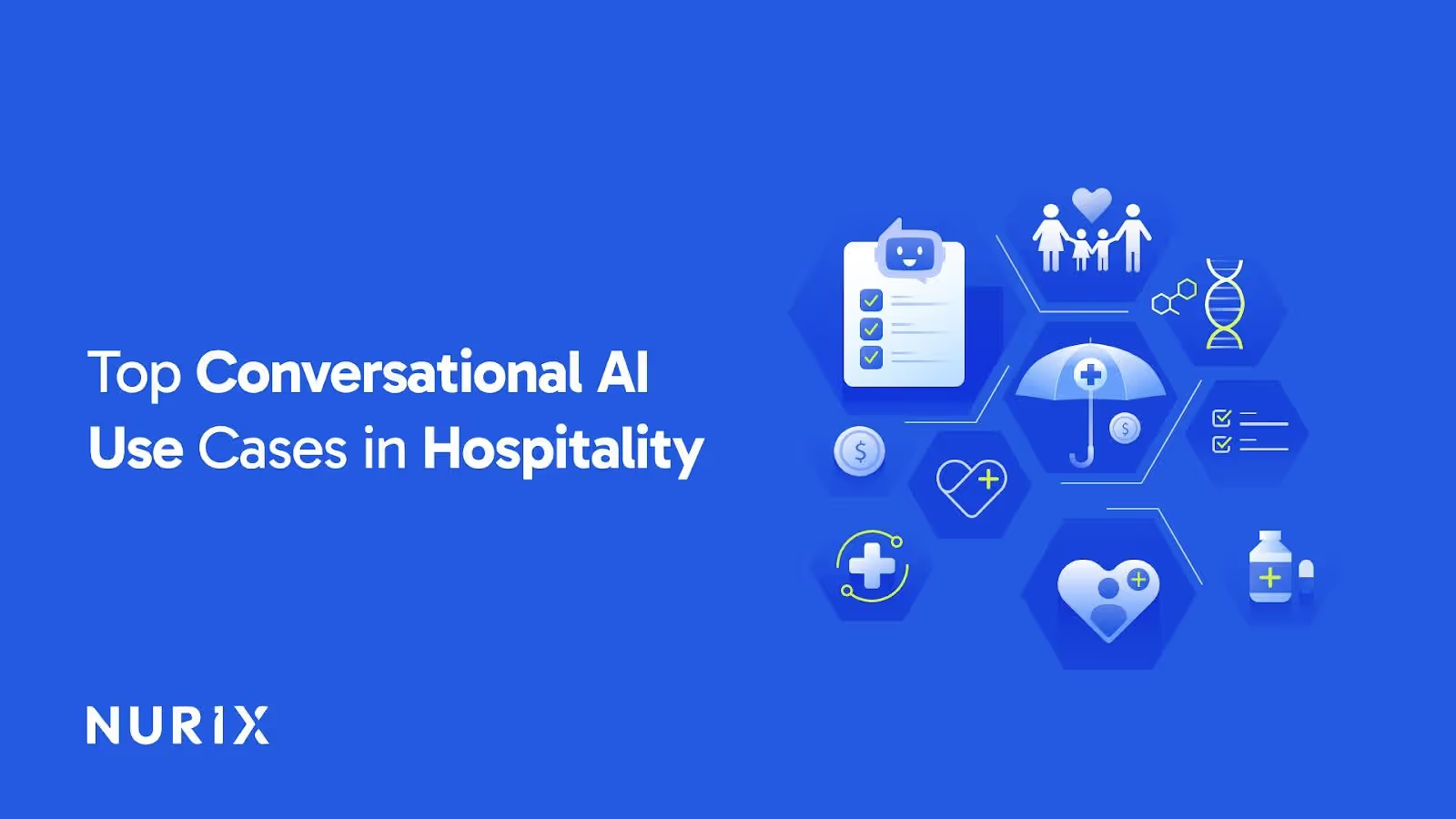The way businesses communicate with customers often reveals their true priorities. As Jeff Bezos once said, “We see our customers as guests to a party, and we are the hosts.” How well hospitality businesses host their digital dialogues can make all the difference in setting themselves apart.
Many organizations in the hospitality space are actively seeking ways to improve both sales and customer service. There’s a clear appetite for methods that not only answer questions but build engagement and loyalty, without burdening staff with routine tasks. This search has brought conversational AI in hospitality solutions into sharper focus.
This blog will cover the top conversational AI in hospitality use cases that are making a tangible impact, from guest communication to operational support.
Takeaway
- Conversational AI Elevates Guest Interactions: Providing immediate, personalized responses and multilingual support, conversational AI improves engagement and reduces wait times, directly impacting guest satisfaction.
- Operational Costs are Significantly Reduced: Automating routine inquiries and service requests lightens the load on staff, letting them focus on higher-value tasks and cutting operational expenses.
- Booking and Revenue Processes Become More Intelligent: Real-time booking management, dynamic pricing, and targeted upselling powered by AI contribute to smoother transactions and increased revenue streams.
- Voice and Smart Environment Controls Transform Stays: Voice-activated room controls enhance guest convenience and accessibility, while also contributing to energy savings and improved operational management.
- Data-Driven Insights Enable Proactive Service: Conversational AI gathers feedback and analytics that help anticipate guest needs and resolve issues before they escalate, supporting continuous service improvement.
What is Conversational AI?
Conversational AI refers to software systems designed to interact with humans through natural language, via voice or text, by interpreting input, processing information, and generating contextually relevant responses.
These systems automate and handle multi-turn conversations, providing actionable information, services, or support. Applications range from virtual assistants and chatbots to complex interactive voice response solutions.
Core Technology of Conversational AI
To power meaningful, natural conversations, conversational AI relies on a set of core technologies that handle language, context, and action with precision and nuance. These components work in concert to interpret intent and deliver responses that resonate:
- Natural Language Processing (NLP): Converts human language into data that machines interpret, involving tasks like intent recognition, entity extraction, sentiment detection, and syntactic analysis.
- Automatic Speech Recognition (ASR): Transcribes spoken language into text with high accuracy, supporting voice-driven interfaces and call automation.
- Natural Language Generation (NLG): Produces human-like text responses, ensuring clarity, consistency, and context relevant to each conversation.
- Dialog Management: Orchestrates multi-turn dialogs by tracking conversation state, managing context, resolving ambiguities, and ensuring the flow remains coherent.
- Machine Learning Models: Continuously improve intent classification, user understanding, and dialog handling based on real-world conversation data.
- Integration with Back-End Systems: Connects AI-driven conversations to databases, customer profiles, and business applications for transactions, support ticketing, and data retrieval.
- Speech Synthesis/Text-to-Speech (TTS): Converts AI-generated text into natural-sounding voice output across multiple languages and accents.
- Security and Compliance Modules: Enforce authentication, privacy, and access control, meeting regulatory standards such as HIPAA or GDPR.
Understanding the core mechanics behind conversational AI sets the stage for why hospitality businesses are integrating these systems to meet both operational demands and evolving guest expectations with precision.
Why are Hospitality Businesses Implementing Conversational AI?
The push toward conversational AI in hospitality reflects a clear focus on elevating guest experience while managing operational demands with precision. Here’s where these technologies make a tangible difference:
- Immediate Response to Inquiries: Enables around-the-clock handling of guest questions regarding bookings, amenities, and services without dependence on human availability.
- Personalized Guest Interaction: Supports customized communication based on guest profiles and preferences, improving satisfaction and repeat visits.
- Streamlines Booking and Reservations: Automates the booking process, reducing friction and errors while speeding up reservation confirmations.
- Multilingual Support: Provides communication in multiple languages, aiding international guests and expanding market reach.
- Operational Cost Reduction: Decreases reliance on frontline staff for routine inquiries, allowing reallocation of human resources to complex tasks.
- Real-Time Issue Resolution: Quickly addresses common problems or requests, such as room service orders or maintenance needs, enhancing guest experience.
- Collects Actionable Guest Feedback: Gathers insights through conversational exchanges that inform service improvements and trend analysis.
- Supports Contactless Services: Facilitates guest interaction with services via mobile devices or kiosks, aligning with health and safety considerations.
- Drives Ancillary Revenue: Promotes upselling and cross-selling of hotel services like spa packages, dining options, or event tickets through proactive conversations.
The reasons behind adopting conversational AI are best understood through the practical ways it’s applied. Let’s review where this technology delivers the most impact in hospitality operations and guest services.
Here is an interesting read: Top 11 AI Agents Transforming Customer Support in 2025
Top Use Cases of Conversational AI in Hospitality
Conversational AI in hospitality comes into its own when applied to specific operations that directly affect guest experience and business outcomes. Here’s a closer look at the most impactful use cases making waves today:
1. Automated Guest Service and 24/7 Support
Hotels can serve guests around the clock without requiring human staff to be available at all hours.
What it does for the hospitality industry:
- Instant Response Times: Chatbots handle guest inquiries immediately, eliminating wait times for common questions about amenities, check-in procedures, and local attractions.
- Multi-Language Support: AI systems communicate with international guests in over 20 languages, breaking down communication barriers without hiring multilingual staff.
- Cost Reduction: Properties save up to $2 million annually in support costs by automating routine guest interactions and reducing escalations to human agents from 7.6% to 2.6%.
2. Intelligent Booking and Reservation Management
Conversational AI streamlines the entire booking process from initial inquiry to final confirmation.
What it does for the hospitality industry:
- Real-Time Availability: AI systems check room availability, compare prices, and complete bookings instantly while updating inventory across all channels to prevent overbookings.
- Automated Modifications: Guests can modify or cancel reservations through natural language conversations without calling the front desk.
- Dynamic Pricing Integration: AI adjusts pricing recommendations in real-time based on demand patterns, competitor rates, and market conditions.
3. Personalized Recommendations and Upselling
AI analyzes guest data to create targeted suggestions that increase both satisfaction and revenue.
What it does for the hospitality industry:
- Data-Driven Personalization: Systems analyze booking history, preferences, and behavior patterns to suggest relevant room upgrades, spa packages, or dining experiences.
- Automated Upselling Campaigns: Hotels achieve up to 200% increases in upsell package sales through AI-powered WhatsApp campaigns and targeted messaging.
- Revenue Optimization: Properties boost incremental revenue by automatically suggesting complementary services when guests are most likely to purchase.
4. Voice-Activated Room Controls and Smart Environments
Guests control their room environment and request services through voice commands.
What it does for the hospitality industry:
- Enhanced Guest Control: Visitors adjust lighting, temperature, entertainment systems, and window blinds using simple voice commands without touching physical controls.
- Energy Management: Voice-controlled systems reduce hotel energy costs by up to 30% through automated climate control and occupancy-based adjustments.
- Accessibility Improvements: Voice technology provides independence for guests with disabilities who can control room features and request assistance hands-free.
5. Operational Efficiency and Staff Optimization
AI handles routine tasks so human staff can focus on high-value guest interactions.
What it does for the hospitality industry:
- Task Automation: Systems automatically schedule housekeeping, manage maintenance requests, and coordinate room turnover based on real-time occupancy data.
- Staff Productivity: Hotels reduce manual workload through automated inventory management, scheduling, and guest communication systems.
- Performance Analytics: AI provides real-time insights into operational metrics, helping managers optimize staffing levels and resource allocation.
6. Feedback Collection and Reputation Management
Automated systems gather and analyze guest feedback to improve service quality.
What it does for the hospitality industry:
- Real-Time Sentiment Analysis: AI processes guest feedback across multiple platforms to identify service issues and positive trends immediately.
- Automated Response Generation: Systems draft personalized responses to reviews and surveys, maintaining consistent guest engagement while saving staff time.
- Predictive Service Recovery: AI flags potential problems based on feedback patterns, allowing hotels to address issues before they escalate into negative reviews.
7. Revenue Management and Dynamic Pricing
AI systems analyze market data to optimize pricing strategies and maximize profitability.
What it does for the hospitality industry:
- Demand Forecasting: Machine learning algorithms predict booking patterns using historical data, local events, weather conditions, and competitor analysis.
- Real-Time Price Adjustments: Hotels increase revenue by 17% on average through AI-powered dynamic pricing that responds to market conditions instantly.
- Total Revenue Optimization: Systems analyze guest spending across all hotel services to recommend personalized packages that maximize ancillary revenue beyond room rates.
8. Virtual Concierge Services
AI-powered concierges provide comprehensive guest assistance without human intervention.
What it does for the hospitality industry:
- Local Expertise: Virtual assistants offer personalized recommendations for dining, entertainment, and attractions based on guest preferences and real-time conditions.
- Service Coordination: AI manages restaurant reservations, spa bookings, and transportation arrangements through integrated hotel systems.
- Check-in/Check-out Automation: Digital concierges handle pre-arrival communications, room assignments, and departure procedures to reduce front desk queues.
What’s driving adoption today provides context for the emerging shifts shaping the near future of conversational AI in hospitality. Here are the trends gaining momentum beyond immediate use cases.
Top Trends of Conversational AI in Hospitality
The trajectory of conversational AI in hospitality reveals where attention and resources are converging, highlighting which developments are moving beyond early experimentation toward real-world value. Here are the trends gaining traction and shaping expectations.
- Voice-First Room Control Systems: Integration of conversational AI with IoT devices for hands-free room management, with 57% of travelers preferring voice assistants for in-room controls and 48% for service requests, driven by contactless preferences.
- Predictive Guest Service Automation: AI systems analyze guest data to proactively offer services before requests are made, using historical booking patterns and real-time behavior signals to anticipate needs and automate service delivery.
- Biometric-Enhanced Conversational Interfaces: Integration of facial recognition and voice biometrics with conversational AI for personalized interactions, allowing systems to recognize returning guests and customize conversations based on individual profiles.
- Contactless Service Orchestration: AI-powered systems managing entire guest journeys without physical interaction, from check-in through room service to checkout, addressing post-pandemic preferences with 53% of guests prioritizing contactless convenience.
- Behavioral Analytics Integration: AI systems that learn from guest interaction patterns to continuously improve conversation quality and personalization, with the hospitality AI market projected to reach $70.32 billion by 2031 at a 20.36% CAGR.
- Mobile-Native Conversation Design: Conversational interfaces optimized specifically for mobile devices, where 74% of guests are willing to pay 1-5% more for technology that enhances their stay, focusing on touch-friendly interactions and mobile app integration.
Final Thoughts
Conversational AI in hospitality applications proves its worth not simply by replacing human contact but by improving the quality of each interaction. They bridge gaps in service delivery, maintain conversational context, and handle a range of tasks that would otherwise slow down operations or frustrate guests. Simply put, these solutions refine how businesses communicate, delivering measurable value beyond generic automation.
If you’re considering a conversational AI solution that truly understands and acts, NuPlay by Nurix offers a compelling option. It moves the conversation forward with quick, natural replies and integrates deeply into core systems, ensuring dialogue translates to real-world outcomes.
What sets NuPlay apart:
- Human-Like Interaction: Delivers authentic exchanges with less than one-second latency, manages interruptions naturally, and keeps conversations context-aware and secure.
- Action-Oriented Agents: Go beyond chat, booking appointments, updating records, syncing with CRM, ERP, and support tools to convert talk into tasks.
- Brand Voice Controls: Creates AI personalities unique to your brand, creating interactions that feel familiar and reliable.
NuPlay powers hundreds of thousands of conversations monthly, driving significant cost savings and service gains across industries. For a conversational AI in hospitality solution that combines depth, speed, and adaptability, get in touch with us to learn more.










